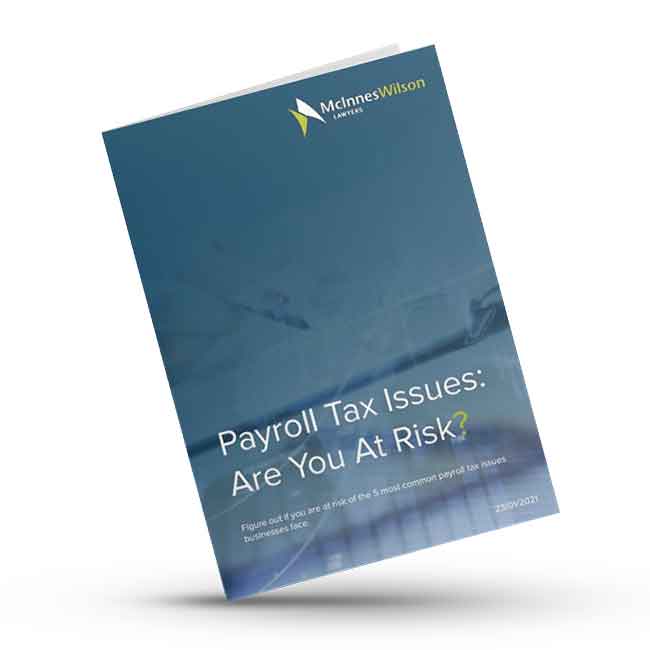Following a reflection on the payroll tax issues we have seen for our clients in the past 12 months, we have put together the top 5 payroll tax issues that business should turn their minds to in 2021 to ensure they are compliant with their payroll tax obligations.
1. EXCLUSION ORDERS AND RELATED BODIES CORPORATE
We often advise on grouping of businesses for payroll tax purposes and the possibility of excluding businesses from a payroll tax group.
Where entities are grouped, the Australian taxable wages of all members of the group are included in determining the threshold deduction available to that group so getting the group members right is important.
Generally, businesses can apply to the Commissioner in the relevant state or territory for an exclusion from grouping for payroll tax purposes where the businesses are considered to be independent and not connected with the other grouped members. The result being that the group’s taxable wages will be lower (by virtue of members with taxable wages being excluded from the group) and the aggregate payroll tax liability of the group will be lower.
However, despite companies operating separate businesses and being otherwise unconnected to each other in their activities and functions, if the companies are ‘related bodies corporate’ the Commissioner cannot exercise the discretion to exclude the companies from being grouped for payroll tax purposes. This is a matter to be kept in mind by advisers when advising clients on structuring for their businesses.
2. COMMON CONTROL OF TRUSTS
An issue that can sometimes slip under the radar is the fact that trusts that are commonly controlled can be grouped for payroll tax purposes.
‘Common control’ of trusts occurs where common parties have a controlling interest in two separate businesses. Even where two trusts are independent and not otherwise connected with the other, this common control can be enough to cause the trusts to be grouped for payroll tax.
In Queensland, determining whether a party has a ‘controlling interest’ in the business carried on by a trust requires that a party is a beneficiary in respect of more than 50% of the value of the interests in the trust. Any person who may benefit from a discretionary trust (i.e. not just a default beneficiary) is deemed to have more than 50% of the value of the interests in the trust.
Furthermore, where trustees of a trust (Trust 1) have a controlling interest in the business carried on by another trust (Trust 2) (i.e. is a beneficiary in respect of more than 50% of the value of the interests in the Trust 2), a beneficiary who has a controlling interest in Trust 1 is taken to have a controlling interest in Trust 2. As a result of the common control of the Trust 1 and Trust 2, these trusts would be grouped for payroll tax purposes.
Because a payroll tax group is formed automatically by virtue of the provisions in the legislation (i.e. it is not at the Commissioner’s discretion or as a result of some action) it is the responsibility of the taxpayer to apply to the Commissioner for an exercise of the Commissioner’s discretion to grant an exclusion order in relation to the grouping of the trusts.
3. AUSTRALIAN TAXABLE WAGES
Where a business pays taxable wages in multiple states or territories around Australia (and even wages paid to employees or contractors who are not in Australia), errors often occur in the calculation of the Australian taxable wages for the entities and how they are disclosed to the various Australian revenue authorities.
Getting the taxable wages correct for businesses can have consequences for determining the availability of threshold deductions across the various states and territories.
With data matching becoming easier across a range of Government authorities, the quality and consistency of the data that is provided is critical.
Errors in calculations can result in unpaid tax liabilities and penalties being imposed where higher taxable wages were actually paid.
Also, inconsistencies can lead to audits or investigations which take business owners’ time and attention away from running their business.
4. EMPLOYEES VERSES CONTRACTORS
Determining whether a person has been engaged as an employee or a contractor has long been an area of concern for businesses.
Whilst businesses may receive pressure from workers for them to be treated as contractors, the liability for unpaid payroll tax if persons who are employees under the law are treated as contractors lies with the business.
We recommend businesses consider the use of contractors and the terms (and documentation) of their engagement carefully before agreeing to engage people on that basis.
5. REVIEW PROCESSES
Payroll tax compliance obligations may change and become incorrect as operations expand and extend across jurisdictions.
We recommend that businesses implement a process for conduct a 12 month review of their payroll tax position and compliance. However, for businesses where operations are rapidly changing or growing reviews should occur on a more regular basis to ensure that they are compliant.
Download our free Risk Assessment PDF - 'Payroll Tax Issues: Are You At Risk?'
HOW CAN WE HELP YOU?
McInnes Wilson Lawyers can help you by:
- reviewing businesses payroll tax processes and positions;
- providing advice on payroll tax obligations;
- providing advice on whether a worker is an employee or contractor;
- drafting private ruling applications to the Australian revenue authorities to obtain orders excluding entities from payroll tax groups;
- assisting with audits by the Australian revenue authorities in relation to payroll tax.
If you require assistance or any further information please contact Taryn Hartley.
Principal

